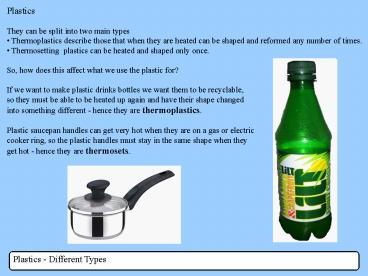Plastics Different Types - PowerPoint PPT Presentation
1 / 4
Title:
Plastics Different Types
Description:
Thermoplastics describe those that when they are heated can be shaped and ... HIPS - High Impact Polystyrene Sheet, available in a wide range of colours but ... – PowerPoint PPT presentation
Number of Views:40
Avg rating:3.0/5.0
Title: Plastics Different Types
1
- Plastics
- They can be split into two main types
- Thermoplastics describe those that when they are
heated can be shaped and reformed any number of
times. - Thermosetting plastics can be heated and shaped
only once. - So, how does this affect what we use the plastic
for? - If we want to make plastic drinks bottles we want
them to be recyclable, - so they must be able to be heated up again and
have their shape changed - into something different - hence they are
thermoplastics. - Plastic saucepan handles can get very hot when
they are on a gas or electric - cooker ring, so the plastic handles must stay in
the same shape when they - get hot - hence they are thermosets.
Plastics - Different Types
2
- Some common thermoplastics are
- Acrylic - available in a wide range of colours
and thicknesses (from 2mm to 15mm or more) but is
brittle, - i.e. tends to crack more easily when dropped.
- HIPS - High Impact Polystyrene Sheet, available
in a wide range of colours but tends to be quite
thin - (1mm to 3mm or so) but is quite tough, hence
its name High Impact. - PET - This plastic is used to make all the fizzy
drinks bottles as it creates a superb gas
barrier, hence - the fizz cannot get out and your drink stays
fizzy for longer.
Not just for making simple objects. Being thin
HIPS is great for making complex curved shapes.
Plastics - Thermoplastics
3
- Some common thermosets are
- Urea-formaldehyde is used commonly on kitchen
worktops (i.e Formica) where it is applied as a
thin - sheet on top of another material, for example
chipboard or mdf. - Glass Reinforced Plastic (GRP) - as its name
describes this is a plastic which has had its
strength - increased by reinforcing it with fibres of
glass. Car bodies and canoes are both sometimes
made - from GRP.
Why do you think plastic light bulb fittings need
to be made from a thermoset?
Plastics - Thermosets
4
As the picture above shows a piece of plastic is
held in the FRAME and then HEATED. This causes
the plastic to go soft. The soft plastic is then
automatically moved to the MOLD where pressure is
used to PRESS it into the right shape. The
plastic then cools and the piece removed.
Plastics - Press Forming































